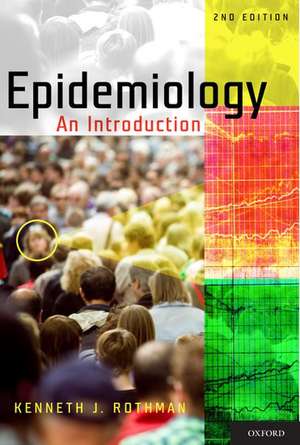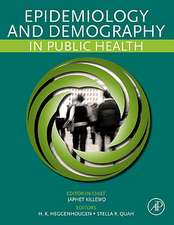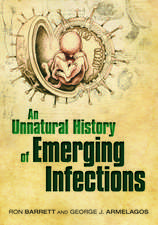Epidemiology: An Introduction
Autor Kenneth J. Rothmanen Limba Engleză Paperback – 21 iun 2012
Preț: 432.62 lei
Preț vechi: 595.05 lei
-27% Nou
Puncte Express: 649
Preț estimativ în valută:
82.78€ • 86.44$ • 68.36£
82.78€ • 86.44$ • 68.36£
Carte disponibilă
Livrare economică 15-21 martie
Livrare express 11-15 martie pentru 164.59 lei
Preluare comenzi: 021 569.72.76
Specificații
ISBN-13: 9780199754557
ISBN-10: 0199754551
Pagini: 280
Ilustrații: 34 illustrations
Dimensiuni: 155 x 231 x 18 mm
Greutate: 0.43 kg
Ediția:2nd edition.
Editura: Oxford University Press
Colecția OUP USA
Locul publicării:New York, United States
ISBN-10: 0199754551
Pagini: 280
Ilustrații: 34 illustrations
Dimensiuni: 155 x 231 x 18 mm
Greutate: 0.43 kg
Ediția:2nd edition.
Editura: Oxford University Press
Colecția OUP USA
Locul publicării:New York, United States
Recenzii
The small size and relaxed narrative style almost persuade the reader that they are enjoying an interesting novel, and, unlike bulkier tomes, it lends itself to reading on the move or at home. However, far from light reading, the content provides indepth, well constructed descriptions of theories and concepts. These are supported by practical examples, using widely-known studies and common conditions, which even someone at the beginning of their epidemiology education could easily connect with with... In this respect. the book is useful to the graduate student and encourages an appreciation of the public health considerations common to many diseases and conditions. The narrative style is used to great advantage in some chapters, to discuss causation, measures of disease occurrence and epidemiology in clinical settings, as well as in the new chapters in this edition which describe the pioneers of epidemiology and infectious disease epidemiology.
In summary, this book is a brilliant introductory book to learn concepts of epidemiology. In contrast to the many available introductory books (several of them written in a naive way), this book does not trivialize these concepts. It perfectly prepares the reader for the reference book of epidemiologic methods entitled "Modern Epidemiology" by Rothman et al... I am not aware of any other introductory book of epidemiology that presents these many epidemiologic concepts. It is a perfect--although demanding--reader for an introductory course of epidemiology in master programs of epidemiology, public health, and at medical schools.
If you want a thorough grounding in technical terms, Rothman is unsurpassed.
This is an excellent introduction to the principles and concepts of epidemiology. In a little over 200 pages Rothman covers all the essential topics for an introductory graduate level course in epidemiology.
Epidemiology: An Introduction is a superb addition to other publications that have appeared in the past decade. The author has achieved the stated goal of providing a coherent overview of epidemiologic principles and concepts.
Kenneth Rothman has taken the time to write a short and excellent introductory epidemiology textbook....Frequently introductory texts strive for brevity through superficiality of coverage. Rothman chose a different approach: selectivity of subject matter. As a result, Epidemiology: An Introduction provides an exceptionally lucid overview of analytic epidemiology.... The mix of text, graphics, tables, and sidebars that is used throughout the book proves very useful in explicating important concepts such as confounding, interaction, study design, and biases, which may be challenging to the student in an introductory course.... The clarity of expression in this book should be an inspiration to other authors and teachers of epidemiology.
This text is ideal for beginners in epidemiological statistics to learn the terminology and understand how and when to use statistical tools. The text focuses on concepts, not on mathematics, and discusses statistical techniques in the context of the real problems they can solve. This text bridges the gap between what is taught in an introductory statistics text and what you need to be an effective researcher and analyst.
Students and scholars who pursue epidemiology as a career should find this book a useful addition to their library ... a worthwhile new edition
In summary, this book is a brilliant introductory book to learn concepts of epidemiology. In contrast to the many available introductory books (several of them written in a naive way), this book does not trivialize these concepts. It perfectly prepares the reader for the reference book of epidemiologic methods entitled "Modern Epidemiology" by Rothman et al... I am not aware of any other introductory book of epidemiology that presents these many epidemiologic concepts. It is a perfect--although demanding--reader for an introductory course of epidemiology in master programs of epidemiology, public health, and at medical schools.
If you want a thorough grounding in technical terms, Rothman is unsurpassed.
This is an excellent introduction to the principles and concepts of epidemiology. In a little over 200 pages Rothman covers all the essential topics for an introductory graduate level course in epidemiology.
Epidemiology: An Introduction is a superb addition to other publications that have appeared in the past decade. The author has achieved the stated goal of providing a coherent overview of epidemiologic principles and concepts.
Kenneth Rothman has taken the time to write a short and excellent introductory epidemiology textbook....Frequently introductory texts strive for brevity through superficiality of coverage. Rothman chose a different approach: selectivity of subject matter. As a result, Epidemiology: An Introduction provides an exceptionally lucid overview of analytic epidemiology.... The mix of text, graphics, tables, and sidebars that is used throughout the book proves very useful in explicating important concepts such as confounding, interaction, study design, and biases, which may be challenging to the student in an introductory course.... The clarity of expression in this book should be an inspiration to other authors and teachers of epidemiology.
This text is ideal for beginners in epidemiological statistics to learn the terminology and understand how and when to use statistical tools. The text focuses on concepts, not on mathematics, and discusses statistical techniques in the context of the real problems they can solve. This text bridges the gap between what is taught in an introductory statistics text and what you need to be an effective researcher and analyst.
Students and scholars who pursue epidemiology as a career should find this book a useful addition to their library ... a worthwhile new edition
Notă biografică
Kenneth J. Rothman, DrPH, is a Distinguished Fellow at RTI International, an independent nonprofit research institute dedicated to improving the human condition. He is also Professor in the Departments of Epidemiology and Medicine at Boston University. His research interests in epidemiology have spanned a wide range of health problems, including cancer, cardiovascular disease, neurologic disease, birth defects, injuries, environmental exposures, and drug epidemiology, but his main career focus has been the development and teaching of the concepts and methods of epidemiologic research.












